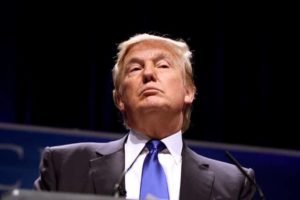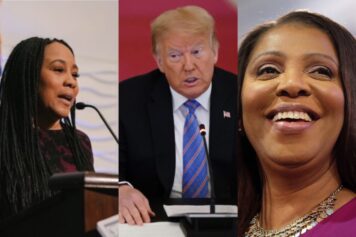
Donald Trump (Gage Skidmore)
A leaked outline of President Donald Trump’s Religious Freedom order has several legal and policy experts concerned that the directive could potentially legalize discrimination on the basis of religion, gender and sexual orientation.
The four-page draft order, obtained by The Investigative Fund and The Nation on Thursday, Feb. 3, was riddled with unduly broad language aimed at creating sweeping exemptions for people and organizations who hold religious and/or moral objections to same-sex marriage, premarital sex, abortion and transgender identity. Essentially, it would protect a number of “religious organizations” from legal sanctions for their refusal to give service to people who “participate in activities that violate their conscious.”
Trump’s order, which hasn’t been signed yet but is making its rounds through administrative staff and advocacy groups, would also hinder women’s access to contraception and abortion services through the Affordable Care Act, The Nation reported. It would require that the U.S. Department of Health and Human Services guarantee that anyone buying insurance through the health care exchange have the option to purchase a plan (subsidized or unsubsidized) that doesn’t cover abortions.
Since the draft leaked, some legal experts have expressed worry that the executive order, if signed and enacted, could exceed the authority of the executive branch and possibly violate the Establishment Clause of the First Amendment.
“The executive order would appear to require agencies to provide extensive exemptions from a staggering number of federal laws — without regard to whether such laws substantially burden religious exercise,” Marty Lederman, a professor at Georgetown University Law Center and an expert on church-state separation, told The Nation. “The exemptions would raise serious First Amendment questions, as well, because they would go far beyond what the Supreme Court has identified as the limits of permissive religious accommodations.”
What’s also problematic about Trump’s executive order is its broad definitions for “religious organizations” and what it considers “religious exercise.” For instance, the directive’s expansive definition for “religious organizations” includes “any organization, including closely held for-profit corporations,” that provide social services, education and health care. It also covers everyday citizens seeking a job or employing others; receiving government grants or contracts; or participating in the marketplace, the public square or interfacing with federal, state or local governments.”
In addition, the order’s rationale for “religious exercise” extends to “any act or refusal to act that’s motivated by a sincerely held religious belief — whether or not the act is required or compelled by, or central to, a system of religious belief.”
Ira Lupu, a professor emeritus at George Washington University’s law school asserted that the language of the executive order was a bit too expansive and seemingly offered certain privileges to conservative Catholics and evangelical Christians who hold a particular set of beliefs regarding gender identity, birth control and sexual orientation. He added that the order’s rhetoric also ran the risk of permitting government employees to decline, on the grounds of religion, to process paperwork or answer the questions of citizens whose benefits depend on same-sex marriages.
If other federal employees don’t “fill the gap,” it might “lead to a situation where marriage equality was being de facto undermined by government employees, especially in religiously conservative communities,” despite previous Supreme Court rulings, Lupu said.
Legal counselors like Jenny Pizer, a policy director for Lambda Legal, also warned that the order could allow organizations receiving federal funds or contracts to provide child welfare services to refuse necessary care to LGBTQ children in foster care. Under the order, she said organizations could legally decline to refer LGBTQ children to another agency or home that’d be more protective and affirming and instead place them in a setting that’s aggressively hostile to who they are.
Conservative Christians “would say this is a nondiscrimination order,” Pizer asserted. “We disagree. We would say being denied the ability to discriminate against others is not discrimination against you.”
To complement the sweeping protections over religious organizations, Section 4 of Trump’s executive would allow the Department of Justice to establish a new section or working group aimed at protecting “religious freedom,” The Nation reported. The White House has yet to comment on the proposed draft order and Press Secretary Sean Spicer, prior to the document’s leak, refused to confirm or deny whether there was a religious freedom order in the works.
I’m not getting ahead of the executive orders that we may or may not issue,” Spicer told reporters on Monday, Jan. 30. “There is a lot of executive orders, a lot of things that the president has talked about and will continue to fulfill, but we have nothing on that front now.”


